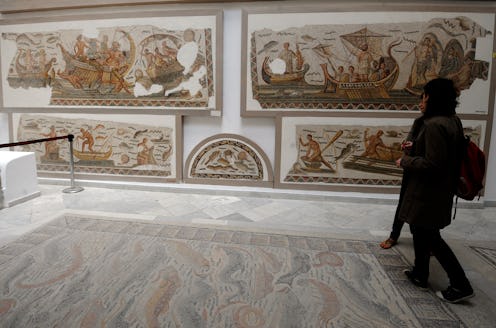News
Where Were The Tunisia Shooting Victims From?
At least 19 people were killed when gunmen attacked the National Bardo Museum in Tunis, Tunisia on Wednesday morning. Though two gunmen were killed by police, bringing the death toll to at least 21, there is a possibility that even more militants were involved — up to five. The Tunisian Prime Minister, Habib Essid, warned that two or three shooters may have escaped and are roaming free. Although nothing is known yet about who the gunmen are or whether they are part of a larger terrorist organization, officials have released some information about the shooting, including some shocking news: Of the 19 killed, 17 victims were foreign tourists to the country, and only two were native Tunisians.
Many people have commented on the fact that the museum lies in very close proximity to the Tunisian Parliament, questioning whether the attack was intended to symbolically target the largely Arab nation of Tunisia. The Parliament, located next to the museum, was evacuated as the hostage situation unfolded. But despite the museum's closeness to the Tunisian government building, the fact that the victims hailed from so many different countries throws into question the idea that it was an attack on Tunisia itself. If only two Tunisians were killed in the attack, what — or who — was the target? And perhaps more importantly, who were the victims?
Besides the two Tunisians killed — a cleaning woman who worked at the museum, and a security officer — the 17 tourists murdered came from Italy, Poland, Germany, Spain, and possibly the United Kingdom. In addition to those killed in the attack in Tunisia's capital, 24 more people were injured, 22 of whom were tourists. Poland's Foreign Ministry said three Poles were injured, while the Italian Foreign Ministry said at least two Italians were among those injured. Neither commented on the ethnicity of those who died.
In a national statement, Essid suggested the attack was aimed at Tunisia as a country:
All Tunisians should be united after this attack which was aimed at destroying the Tunisian economy.
Essid said foreign victims were "hunted down" as they exited cruise ship buses to visit the Bardo Museum:
The terrorists fired randomly as they got off the buses. As they fled, they were hunted and chased down.
The shooters initially targeted the museum at about noon, striking as tourists entered the museum and then proceeding to hold hostages for almost three hours. Hundreds of museum-goers were able to escape, and when police and security forces stormed the museum two hours after the hostage situation began, many hostages were freed, and two gunmen were shot and killed.
Ewa Kopacz, prime minister of Poland, confirmed that some victims were on a tour bus in front of the museum when the gunmen opened fire on them. Kopacz did not specify how many victims were Polish, but she did say 20 Polish tourists are safe.
Reports that two Britons were killed have been unconfirmed, as Essid confirmed only that foreign victims were from Spain, Italy, Poland, and Germany. United States Secretary of State John Kerry said in a statement:
The United States condemns in the strongest possible terms today's deadly terrorist attack at the National Bardo Museum in Tunis, where gunmen killed 19 people and wounded more than 20 others. We extend our heartfelt sympathy to the victims' families and loved ones.
Kerry continued:
We commend Tunisian authorities' rapid response to today's wanton violence and their efforts to resolve the hostage situation and restore calm. The United States stands with the Tunisian people at this difficult time and continues to support the Tunisian government's efforts to advance a secure, prosperous, and democratic Tunisia.
Many have speculated that the attack may have been planned by a larger terrorist group, such as ISIS. European Union foreign policy chief Federica Mogherini said the violence was perpetrated by members of "terrorist organizations," while French Prime Minister Manuel Valls called it a "terrorist attack." French President François Hollande said:
When it comes to human life we are incredibly crushed by the terrorist machine. We had these painful events in France in January and it's true today in Tunis as it was in Copenhagen, we are all affected.
Tunisia is the country where the Arab Spring began, and The New York Times writes that ISIS "have sought to take advantage of the new level of freedom after the revolution." Tunisia is one of the largest sources of foreign fighters joining ISIS.
